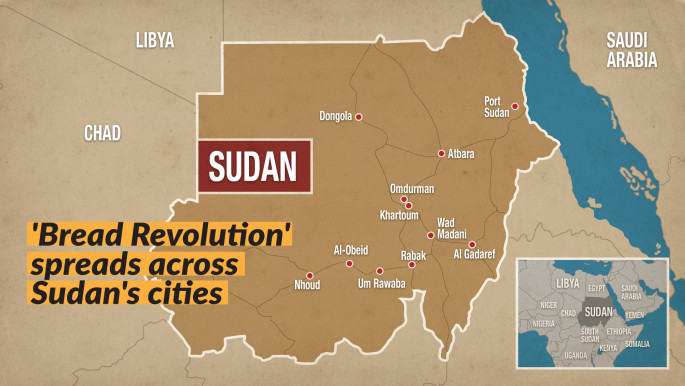Sudan's Bashir says WhatsApp, Facebook can't replace presidents
Organisers of the anti-government protests that have rocked Sudan for weeks, have made routine use of social media platforms like Facebook, WhatsApp and Twitter to get out the crowds.
"Changing the government or presidents cannot be done through WhatsApp or Facebook," Bashir told a televised rally attended by hundreds of loyalists in the eastern town of Kassala.
"It can be done only through elections. It's only the people who decide who will be the president," he said.
Activists have extensively documented the protests which erupted on 19 December and have flooded social media with footage of clashes with security forces.
The demonstrations have been spearheaded by the Sudanese Professionals' Association (SPA) which issues regular online announcements of forthcoming rallies, using the Arabic hashtags #Sudan_cities_uprise or #Just_Fall.
 |
Other hashtags such as #SudanRevolts and #SudanUprising have also helped build momentum, amassing hundreds of tweets and retweets by the hour.
The Sudanese government has sought to curtail the use of social networks, activists and analysts say.
Internet users have reported difficulties accessing Facebook, Twitter and WhatsApp since the early days of the protests.
The demonstrations began in the farming town of Atbara against the government's decision to triple the price of bread.
But they have mushroomed into nationwide protests widely seen as the biggest threat to Bashir's rule since he took power in an Islamist-backed coup in 1989.
Anger has been mounting for years over deteriorating living conditions and growing economic hardship.
Sudan's economic woes triggered mass protests in 2013 and 2016 that were put down only at the cost of dozens of deaths.
But despite Bashir's repeated calls for patience, public hostility towards his policies has only intensified.
"The situation is difficult, but not impossible," the president told on Thursday's rally.
"We will concentrate all efforts on satisfying the people, particularly the young."
Officials say 30 people have died in protest-related violence since the demonstrations began on December 19.
Human rights groups say children and medics have been among more than 40 people killed.
Bashir was speaking in Kassala, not far from the Eritrean border, and he told the rally he was reopening the border crossings after a year-long closure which had hit the area's economy.
He gave no reason for the reopening but their closure was announced as part of Sudan's campaign to disarm organised people trafficking gangs that it has blamed for the transit of migrants from the Horn of Africa towards Europe.
Follow us on Twitter: @The_NewArab





 Follow the Middle East's top stories in English at The New Arab on Google News
Follow the Middle East's top stories in English at The New Arab on Google News
![Israeli forces ordered bombed Gaza's Jabalia, ordering residents to leave [Getty]](/sites/default/files/styles/image_330x185/public/2176418030.jpeg?h=a5f2f23a&itok=_YGZaP1z)

